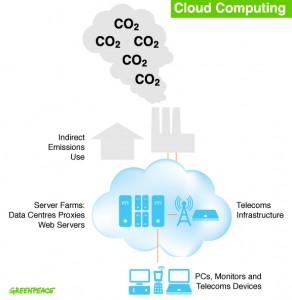In an astute move, Greenpeace is capitalising on iPad frenzy by launching a new report into the carbon footprint of cloud computing.
Make IT Green: Cloud Computing and its Contribution to Climate Change shows how the launch of quintessential cloud computing devices like the Apple iPad, which offer users access to the ‘cloud’ of online services like social networks and video streaming, can contribute to a much larger carbon footprint of the Information Technology (IT) sector than previously estimated.
To be clear: We are not picking on Apple. We are not dissing the iPad. But maybe someone can come up with an app that calculates the carbon footprint of using different web sites based on their location and energy deals. Apple is the master of promotion, and while we marvel at the sleek unpolluted design of the iPad, we need to think about where this is all leading and how like all good surfers we can make sure our environment stays clean and green.
The report builds on previous industry research and shows that at current growth rates data centers and telecommunication networks will consume about 1,963 billion kilowatt hours of electricity in 2020. That is more than triple their current consumption and more than the current electricity consumption of France, Germany, Canada and Brazil combined. However, the report also shows how IT can avert climate chaos by becoming a transformative force advocating for solutions that increase the use of renewable energy.
The Register has a helpful summary of the report which also highlights an interesting difference between Apple and Google as cloud proprietors:
Apple’s $1bn data center in Catawba County, North Carolina, currently under construction, will get its energy from a local electrical grid that contains only 3.8 per cent renewable energy, and a full 50.5 per cent from dirty ol’ coal and 38.7 per cent from nasty nukes. Google’s data center in The Dalles, Oregon, by contrast, gets 50.9 per cent of its juice from renewable sources, according to Greenpeace.
Greenpeace is also pretty critical of Facebook’s carbon footprint.

